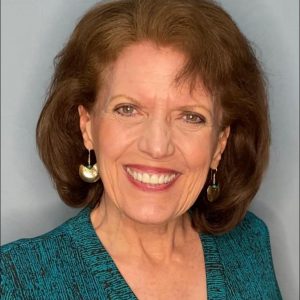During my lifetime, I’ve witnessed the baptisms of about a thousand people — mostly children and teens, few adults. While all baptisms are meaningful and contain an element of tenderness and vulnerability, there is something a bit “different” about adult baptisms.
Children and teens, still in the early stages of maturation, have relatively few life experiences. Their commitment to follow Jesus, while valid and sweet, is nonetheless couched in a measure of naïveté.

Naomi King Walker
Adults, however, have experienced much of the good and bad of life — and have the scars and bruises to show for it. For an adult to confess “Jesus is Lord,” there is a deeper level of humility and cognitive decision-making going on. Often, the story of an adult’s journey to their moment of baptism is profound.
Recently, our congregation witnessed the baptism of Apollina Whitney, a young wife and mother of two children. Following in our baptismal tradition, Apollina wrote her “faith story” and asked our pastor, Chris George, to read it to our congregation:
How does an avowed Atheist become a Baptist? It began as a social studies lesson.
My 9-year-old was reading a biography of Benjamin Franklin that mentioned his baptism, and she didn’t know what the word meant. She’d seen churches before, but she’d never been inside one and had no idea what went on there, and we liked it that way.
My experiences with Christians in the past had not been positive, and I was quite content not to have anything to do with religion. Nonetheless, I wasn’t going to let my child grow up culturally illiterate, so I decided that with so many churches livestreaming their services due to COVID it was the perfect time to be a fly on the wall.
I chose Smoke Rise because it was one of the churches we frequently passed by and because Baptists seemed to me to be most representative of the type of Christians she was likely to encounter growing up in the South. I put the service on, intending to simply point out things like “This is called the pulpit,” “The songbooks they’re using are called hymnals,” and “That guy is the preacher,” and then braced myself to be infuriated by what I assumed I’d hear in the sermon.
“These were not the Baptists I thought I was looking for.”
And then that preacher started talking. He talked about gender discrimination and objectification and how he’d noticed it more since having a daughter. He talked about how Jesus didn’t view women that way. I couldn’t believe what I was hearing. These were not the Baptists I thought I was looking for. I called my husband and told him, “You’re not gonna believe what they’re doing at that church.”
I tuned in again the next Sunday, and the next. I listened to him quote Johnny Cash and Carl Sagan. I heard him say that maybe some of the things in the Bible were just metaphors but that didn’t mean they weren’t real. I went back and binge-watched a year’s worth of archived sermons and Journeys videos, and after each one I’d call my husband again and say, “You have to listen to this.”
Over the course of the next year, I didn’t miss a service. When Dr. George went on sabbatical and a series of guest preachers was lined up, I figured I’d quickly be disillusioned, but I was wrong. They were all amazing. I kept thinking, “Where have THESE Christians been? Why aren’t these voices being amplified?”
Then came the news out of Uvalde. More tragedy, more thoughts and prayers, more inaction. That Sunday Bart (McNeil) got up to pray and said, “Lord, We have had enough of empty consolations and pious platitudes.” It was exactly what I felt was needed in that moment. I couldn’t stop thinking about it.
Two days later, with a trunk full of groceries, I impulsively stopped at the church on my way home and asked to speak to a pastor. I was sobbing and I think everyone in the office that day probably thought I was crazy. I talked to Bart, told him the whole story, and said that we wanted to join the church. We started attending services in person the following Sunday, still treading lightly and not fully knowing what to make of all this, but with the feeling that somehow this was where we needed to be.
“In all these people I saw love and grace embodied.”
I was concerned about how my autistic son would handle Sunday school and VBS, but Becky made sure he felt comfortable and included. I wasn’t sure we’d be able to do the Wednesday night suppers because he’s an extremely picky eater, but Lou (Tankersley) offered to make him chicken tenders every week even when they weren’t on the menu. A tree fell across our driveway two days before Christmas and I reached out to Becky (Caswell Speight) asking if she knew of anyone who could help me move it, and next thing I know Bob Jernigan was there with a chainsaw. The Faith and Issues Sunday school class made me feel there was room on this journey for my questions and doubts. In all these people I saw love and grace embodied.
Finally, in one of many meetings my husband and I had with Dr. George in which I kept asking what exactly I needed to believe in order to be part of this church (because it couldn’t possibly be as simple as it seemed; I felt like there MUST be some sort of criteria!), he said it basically comes down to accepting that “I can’t, but God can.” That was when it all clicked. Yes, this isn’t always easy, but I don’t have to do it alone. I do need Jesus, and although I still don’t understand everything, I can come to him now, just as I am.”
As our attention turned to the baptistry, a moment later we heard Apollina’s voice clearly proclaim, “Jesus Christ is Lord!” just before she was dipped into the baptismal waters.
“Raised again to walk in newness of life.” Transformed. ALL of us.
Naomi King Walker is a semi-retired music minister and member of Smoke Rise Baptist Church in Stone Mountain, Ga.
Related articles:
Baptism is a call to social action, not a genteel ceremony, Braxton says
On the baptism of our firstborn | Opinion by Emily Hull McGee
‘Doesn’t anyone want to be baptized anymore?’ The ‘tangibilifying’ grace of baptism | Opinion by Bill Leonard


